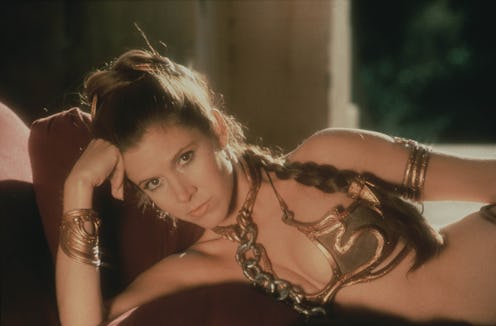Fashion
What That Gold Bikini Says About Hollywood & Women

I fully expect that in the coming weeks we'll see a few dozen thinkpieces from men thanking our now-departed queen Carrie Fisher for her contribution to their teenage years. Princess Leia's infamous "slave Leia" outfit, complete with horrifically uncomfortable-looking gold bra, can tell us a lot about Hollywood's messed-up relationship with women's bodies.
By which I mean the same dudes writing thinkpieces eulogizing their fantasy sex symbol version of Carrie Fisher from 33 years ago are likely to also call Kim K a slut and a bad role model for baring her body on her terms rather than for a script. The "slave Leia" image, now well-trod ground for toymakers and cosplayers alike, was reportedly discontinued last year by Disney after complaints about Leia's continued sexualization.
Fisher seemed to have mixed feelings about the outfit, but one thing was clear: She was unrepentantly feminist when discussing it, even though the costume wasn't her idea. In a 2015 interview with her The Force Awakens costar Daisy Ridley, Fisher told her, "Well, you should fight for your outfit. Don't be a slave like I was. ...You keep fighting against that slave outfit."
And to a parent concerned about the "slave Leia" image and its impact on his child, Fisher said, "To the father who flipped out about it, 'What am I going to tell my kid about why she’s in that outfit?' Tell them that a giant slug captured me and forced me to wear that stupid outfit, and then I killed him because I didn’t like it. And then I took it off. Backstage."
This is of course the most important thing about "slave Leia" — that she saves herself and rises to be the badass Rebellion General Organa. Which is why it's so frustrating to see people focus on the brief amount of screen time Fisher spends in the bikini, not only when it comes to discussing Star Wars and Princess Leia, but when it comes to discussing Fisher herself.
This, unfortunately, is not uncommon.
It's no secret that women in Hollywood struggle to be given equal ground. While this is true across many industries, Hollywood has a long history of portraying women as either helpless, hysterical set dressing, or as dangerous femme fatales using their sex appeal to lure men to their doom.
Now that bald sexual content in films is more accepted, we've moved straight into the era of troublingly common triple-X depictions of women.
The New York Film Academy reported in its analysis of films that 26.2 percent of women actors get at least partially naked on film, compared to 9.4 percent of men. The Academy also found that 28.8 percent of onscreen women wore sexually revealing clothing (7 percent of men), and that only 30.8 percent of speaking characters in films are women — but that number increases by an average of 10.6 percent in films where women are directing.
To make matters worse, Mic reported that, "Female characters were more likely to be depicted wearing sexy clothing, partially nude, and referred to as attractive in comparison to male characters. Girls and women from ages 13 to 20 had a 21.5% chance of being referred to as attractive opposed to 13.8% of women aged 21 to 30 years old."
We've seen, as in the case of Amber Heard, that women can be punished if they refuse to do sex scenes in movies, and yet female performers whose sex tape footage becomes available are relentlessly slut-shamed. Women in real life aren't even safe to wear dresses to work without criticism, but they're expected to be constantly sexy on film.
The "slave Leia" dichotomy is everywhere. People — primarily men, let's be real — drool over Leia's slave outfit and long to see sexy women on screen, but slut-shame women in real life for something as simple as donning spaghetti straps.
The message is this: Women can be sexy and dress sexy and have sex, but only when it's for the entertainment of and under the terms of men.
If I had written this piece before Nov. 8, I might have softened that last line. I might have written, "The message — whether it's sent purposefully or whether it's socially ingrained sexism we need to learn to get over — is..." But after Trump's election, I resolved not to mince words. We have a new president whose rampant sexism was given the all-clear by voters. I believe Trump is not only a reflection of the worst of humanity, but also the worst of the entertainment business.
Carrie Fisher was an embodiment of the best. I can't keep people from reducing her entire wonderful life to her moments of screen time as "slave Leia" any more than I can keep people from leaving slut-shaming comments on every female celebrity's selfies, but I can celebrate her bravery, beauty (and I don't mean just physical beauty), and bold feminism.
Every person can learn something from Carrie Fisher's life. Her humor and grace and constant call-outs of shitty double-standards are something we can't let go of, even though we now have to let go of the lady herself.
One of my favorite Fisher quotes, which comes from her press run for The Force Awakens and sums up the relationship Hollywood and men have with women and their bodies: "They want to hire part of me, not all of me," she said. "They want to hire three fourths, so I have to get rid of the fourth somehow. The fourth can’t be with me. I made a joke."
Images: Century Fox/REX/Shutterstock; Lucasfilm